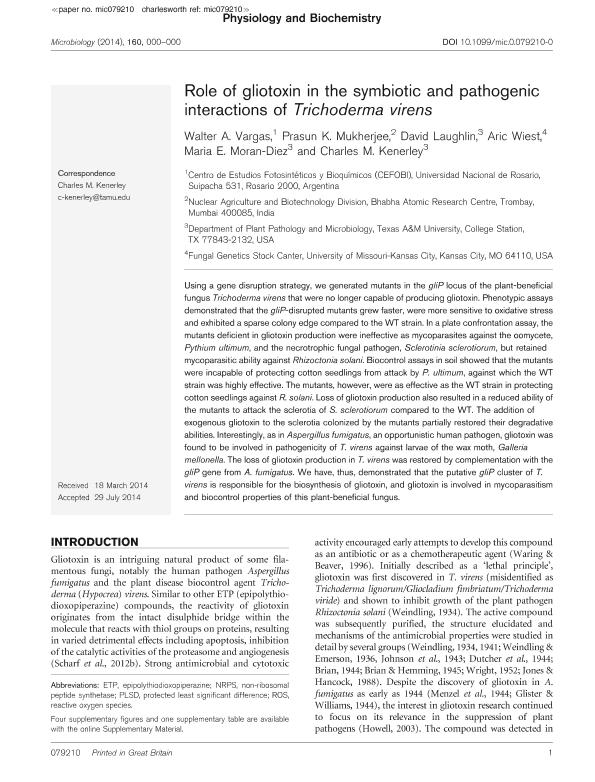Mostrar el registro sencillo del ítem
dc.contributor.author
Vargas, Walter Alberto

dc.contributor.author
Mukherjee, Prasun K.
dc.contributor.author
Laughlin, David
dc.contributor.author
Wiest, Aric
dc.contributor.author
Moran Diez, Maria E.
dc.contributor.author
Kenerley, Charles M.
dc.date.available
2016-10-27T21:19:49Z
dc.date.issued
2014-10
dc.identifier.citation
Vargas, Walter Alberto; Mukherjee, Prasun K.; Laughlin, David; Wiest, Aric; Moran Diez, Maria E.; et al.; Role of gliotoxin in the symbiotic and pathogenic interactions of Trichoderma virens; Maik Nauka/interperiodica/springer; Microbiology; 160; 10-2014; 2319-2330
dc.identifier.issn
0026-2617
dc.identifier.uri
http://hdl.handle.net/11336/7842
dc.description.abstract
Using a gene disruption strategy, we generated mutants in the gliP locus of the plant-beneficial fungus Trichoderma virens that were no longer capable of producing gliotoxin. Phenotypic assays demonstrated that the gliP-disrupted mutants grew faster, were more sensitive to oxidative stress and exhibited a sparse colony edge compared with the WT strain. In a plate confrontation assay, the mutants deficient in gliotoxin production were ineffective as mycoparasites against the oomycete, Pythium ultimum, and the necrotrophic fungal pathogen, Sclerotinia sclerotiorum, but retained mycoparasitic ability against Rhizoctonia solani. Biocontrol assays in soil showed that the mutants were incapable of protecting cotton seedlings from attack by P. ultimum, against which the WT strain was highly effective. The mutants, however, were as effective as the WT strain in protecting cotton seedlings against R. solani. Loss of gliotoxin production also resulted in a reduced ability of the mutants to attack the sclerotia of S. sclerotiorum compared with the WT. The addition of exogenous gliotoxin to the sclerotia colonized by the mutants partially restored their degradative abilities. Interestingly, as in Aspergillus fumigatus, an opportunistic human pathogen, gliotoxin was found to be involved in pathogenicity of T. virens against larvae of the wax moth, Galleria mellonella. The loss of gliotoxin production in T. virens was restored by complementation with the gliP gene from A. fumigatus. We have, thus, demonstrated that the putative gliP cluster of T. virens is responsible for the biosynthesis of gliotoxin, and gliotoxin is involved in mycoparasitism and biocontrol properties of this plant-beneficial fungus
dc.format
application/pdf
dc.language.iso
eng
dc.publisher
Maik Nauka/interperiodica/springer

dc.rights
info:eu-repo/semantics/openAccess
dc.rights.uri
https://creativecommons.org/licenses/by-nc-sa/2.5/ar/
dc.subject
Trichoderma Virens
dc.subject
Gliotoxina
dc.subject
Control Biológico
dc.subject
Proteccion Vegetal
dc.subject.classification
Agronomía, reproducción y protección de plantas

dc.subject.classification
Agricultura, Silvicultura y Pesca

dc.subject.classification
CIENCIAS AGRÍCOLAS

dc.title
Role of gliotoxin in the symbiotic and pathogenic interactions of Trichoderma virens
dc.type
info:eu-repo/semantics/article
dc.type
info:ar-repo/semantics/artículo
dc.type
info:eu-repo/semantics/publishedVersion
dc.date.updated
2016-03-14T12:49:49Z
dc.journal.number
160
dc.journal.pagination
2319-2330
dc.journal.pais
Reino Unido

dc.journal.ciudad
Kiev
dc.description.fil
Fil: Vargas, Walter Alberto. Consejo Nacional de Investigaciones Científicas y Técnicas. Centro Científico Tecnológico Rosario. Centro de Estudios Fotosintéticos y Bioquímicos (i); Argentina
dc.description.fil
Fil: Mukherjee, Prasun K.. Bhabha Atomic Research Centre; India
dc.description.fil
Fil: Laughlin, David. Texas A&M University; Estados Unidos
dc.description.fil
Fil: Wiest, Aric. University Of Missouri; Estados Unidos
dc.description.fil
Fil: Moran Diez, Maria E.. Texas A&M University; Estados Unidos
dc.description.fil
Fil: Kenerley, Charles M.. Texas A; Estados Unidos
dc.journal.title
Microbiology

dc.relation.alternativeid
info:eu-repo/semantics/altIdentifier/url/http://mic.microbiologyresearch.org/content/journal/micro/10.1099/mic.0.079210-0#tab2
dc.relation.alternativeid
info:eu-repo/semantics/altIdentifier/doi/http://dx.doi.org/10.1099/mic.0.079210-0
Archivos asociados
